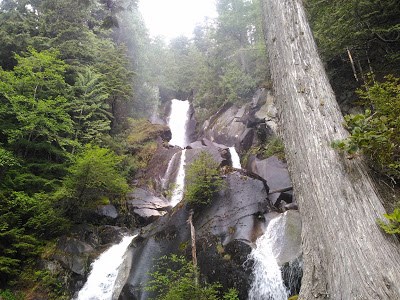The first obstacle is in crossing the river.
You must arrange your own water transport by canoe or kayak. The put-in is midway along the Spit road. Alternatively, there is commercial delivery from Squamish Jetboat and Squamish Boat rental. The landing on the west side of the river is behind a gravel spit near some decaying pilings about 100 metres south of the confluence with Monmouth creek.
Remember that this part of the Squamish river is tidal, so haul your canoe or kayak above the high water line.
The best time to cross is in the early morning before the onset of heavy inflow winds. You’ll be passing a long-abandoned cabin near the start of the trail. Be mindful, as there may be some people occupying it. This old cabin dates from logging operations of the 1950s and was sometimes used by Boy Scouts after that time. The final obstacle is the arduous hike, climb and scramble up 2.6 kilometres and 930 metres. There are many rewards for your pain, starting with cascading waterfalls and ending with a pristine tarn called Echo Lake.
A tarn is a small mountain lake in the alpine zone. The word originates from old Norse language and means a watering hole. The lake area will be ice-free sometime in April and the trail will be snow-free around mid-May. About midway up is Infinity pool, surrounded by smooth granite.
The less hardy people do have the option of a helicopter ride to the helipad at the south end of the lake. This lake is stocked with trout that have grown large. Overnight camping is recommended. The climb down will be hard on your knees. Still, Jen Segger calls this “the best trail that no one hikes.” Monmouth creek is named for a British naval vessel, the HMS Monmouth, which was sunk, along with a second heavy cruiser, at the Battle of Coronel off Chile, on November 1914. With the 1,600 sailors killed in action were four midshipmen and young officer trainees from Canada. They were the first Canadian casualties of WWI and the first members of the newly-formed Royal Canadian Navy to die on duty.
An original part of the 2013 proposal for the Sea to Sky Gondola included an alternative to its present successful location.
The classic mountain scenery of the Monmouth creek area and the spectacular granite waterfalls would have had a gondola built overhead and tourists would have been barged across the river to enjoy a superb experience.
Adventure tourism proponents have not given up on opening up the west side of the Squamish River for easier access to Tantalus Provincial park.
Hopefully, they will keep any human incursions away from the Brackendale Eagles Provincial Park.
Also, there needs to be a few spots which can be accessed only by fit and well-prepared people.
Summary: This 2.6-kilometre trail ascends steeply for 930 metres past smooth granite waterfalls.
Origin of name: An echo is sound reflected back to the listened and can be heard after the original sound has stopped, as is the case with the high mountains enclosing this lake.
Trailhead: Near the confluence of Monmouth creek and Squamish river.
Use: Climbers and canyoneers.
Difficulty: Black for sturdy hikers or blue for climbers.
Elevation: From river at two metres to the lake at 932 metres.
Etiquette: Descending has right of way.



